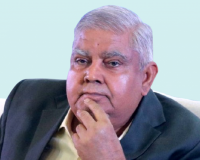- Editorial
- The Sudden Exit of Jagdeep Dhankhar: A Resignation, or a Removal?
The Sudden Exit of Jagdeep Dhankhar: A Resignation, or a Removal?

In a political landscape that rarely offers dull moments, India witnessed yet another twist: the abrupt resignation of Vice President Jagdeep Dhankhar, a constitutional officeholder just two years into his tenure. It wasn't a scheduled exit, nor one propelled by electoral ambitions. Rather, it arrived like a bolt from the blue without fanfare, without warning, and perhaps, without consent.
Just hours before the announcement, Dhankhar was fulfilling his constitutional duties, chairing the Rajya Sabha, planning for upcoming engagements, and speaking in his usual reconciliatory tone. By 9 PM, however, the nation was staring at a resignation letter that cited "health reasons" an explanation that few are ready to buy.
What Really Happened?
Yes, Dhankhar underwent angioplasty earlier in the year, but since then, he has maintained an active schedule, participating in Parliament and public programs alike. So, how did his health deteriorate so drastically between morning and evening? What triggered this sudden decision?
Sources suggest an unscheduled meeting with President Droupadi Murmu preceded the resignation. Adding fuel to the speculation fire is a quiet meeting with Delhi CM Arvind Kejriwal. What was discussed remains under wraps, but political circles are abuzz.
Among the more credible theories is that Dhankhar’s approval of a motion to initiate removal proceedings against Justice Yashwant Verma after the opposition gathered the required 50 MP signatures caused friction with the ruling government. Verma, allegedly linked to a high-profile cash recovery incident, became a flashpoint. The Government preferred to handle such sensitive judiciary matters internally, without offering the opposition any narrative advantage.
This approval by the Vice President, many believe, crossed an invisible line. BJP sources, reportedly blindsided, viewed it as a breach of unspoken loyalty.
From Ally to Afterthought
Jagdeep Dhankhar was never seen as apolitical. From his controversial tenure as Governor of West Bengal, often in direct confrontation with Mamata Banerjee’s government, to his speeches as Vice President openly echoing government lines, Dhankhar was viewed as a loyalist. But in Indian politics, loyalty is often a one-way street.
Dhankhar’s support for the BJP line on issues such as the basic structure doctrine, Supreme Court judgments, and the NJAC (National Judicial Appointments Commission) was both vocal and pointed. He once said the Supreme Court’s judgment striking down the NJAC was a “mockery of the people’s mandate.” He also questioned the very concept of "basic structure," a bedrock principle of constitutional interpretation since the Kesavananda Bharati case of 1973.
Such statements made him a darling of the party’s ideological hardliners, but also drew fire from constitutional experts and civil society alike, many of whom warned that he was overstepping his ceremonial and constitutional boundaries.
How Was His Real Job?
Despite the ideological overtures, his core responsibility remained that of the Chairperson of the Rajya Sabha. Here too, Dhankhar’s tenure has been marked by controversy. He often clashed with the opposition, frequently suspended members, and appeared impatient with dissent.
In the 2023 Manipur crisis, he declined opposition requests to summon the Prime Minister for a statement. When nearly 150 MPs were suspended during the winter session, the highest ever in Indian parliamentary history, critics labeled it the “death of deliberative democracy.”
In 2024, when Opposition Leader Mallikarjun Kharge entered the well of the House to demand attention on the exam paper leak issue, Dhankhar called it a “black spot.” Opposition figures argue he took his constitutional chair too personally and lacked the neutrality expected from it.
Was He Pushed?
The bigger question remains: Was Dhankhar sacked? If not directly, was pressure applied to create a situation where resignation became the only face-saving option?
Political observers say that the answer likely lies in a build-up of multiple disagreements, not just a single misstep. Whether it was his intervention in judicial matters, perceived ambition, or simply being too visible, he may have crossed boundaries Modi and Shah weren’t comfortable with.
Moreover, his recent comments calling the insertion of the words “socialist” and “secular” into the Preamble a “sacrilege to Sanatan values” might have backfired. Ironically, Modi himself has been hailed as one of India’s most ‘socialist’ leaders, rolling out schemes with massive public spending—something Nehru and Indira Gandhi would have been proud of. Dhankhar’s comment perhaps wasn’t aligned with the larger messaging the party wants in 2025 and beyond.
What Next?
The vice president's post is not being filled for the remaining term; the next appointee will hold office for a full five-year term. This makes the selection critical not just for parliamentary arithmetic, but for ideological signaling and Rajya Sabha control.
Speculation is wild. Names floated include senior BJP leaders like Rajnath Singh, Nitin Gadkari, and Anandiben Patel, as well as K. Laxman, president of the party’s OBC Morcha, and even Harivansh Narayan Singh, the current deputy chairman.
More dramatic theories suggest a game of political musical chairs—Rajnath as VP, and Yogi Adityanath moving to Defence Ministry. Some names from outside the BJP’s core circle—like Nitish Kumar and even Shashi Tharoor are also being mentioned, albeit less credibly.
What is clear is that something big shifted behind the scenes, and Dhankhar became collateral damage. Perhaps he became too ambitious, too vocal, or simply too inconvenient at the wrong moment.
A Cautionary Tale
In the end, Dhankhar’s departure sends a clear message: no one is indispensable. Not governors, not vice presidents, not even the most compliant functionaries. In Modi-Shah's BJP, loyalty is transactional, and when the use-case ends, so might the tenure.
The Vice President’s office is meant to rise above politics and protect the Constitution. Dhankhar, critics say, failed to do so. Ironically, his downfall may now restore some of that sanctity.
His legacy will be debated for years—champion of Parliament, critic of judiciary, or just another footnote in the BJP’s long experiment with centralized control. But one thing is certain: his resignation was no coincidence.
000








.jpeg)
